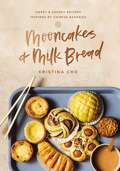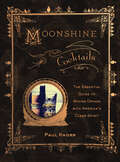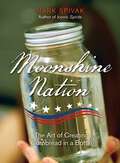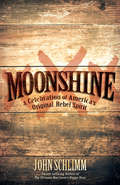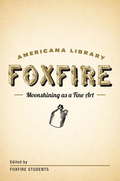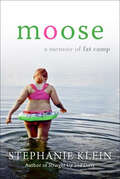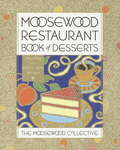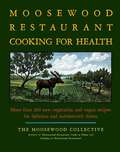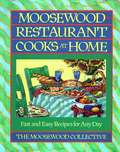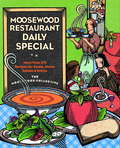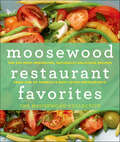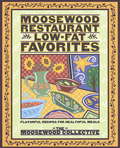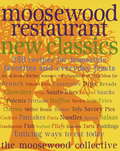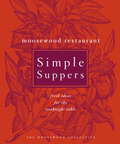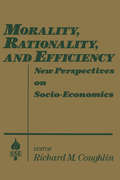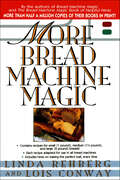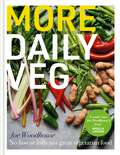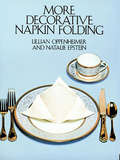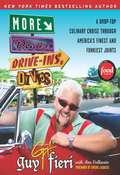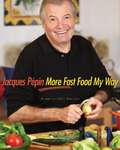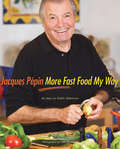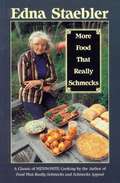- Table View
- List View
Mooncakes and Milk Bread: Sweet and Savory Recipes Inspired by Chinese Bakeries
by Kristina ChoIn Mooncakes & Milk Bread, food blogger Kristina Cho (eatchofood.com) introduces readers to Chinese bakery cooking with fresh, uncomplicated interpretations of classic recipes for the modern baker.Inside you&’ll find sweet and savory baked buns, steamed buns, Chinese breads, unique cookies, whimsical cakes, juicy dumplings, Chinese breakfast dishes, and drinks. Recipes for steamed BBQ pork buns, pineapple buns with a thick slice of butter, silky smooth milk tea, and chocolate Swiss rolls all make an appearance--because a book about Chinese bakeries wouldn&’t be complete without them!Kristina teaches you to whip up these delicacies like a pro, including how toKnead dough without a stand mixerAvoid collapsed steamed bunsInfuse creams and custards with aromatic tea flavorsMix the most workable dumpling doughPleat dumplings like an Asian grandmaThis is the first book to exclusively focus on Chinese bakeries and cafés, but it isn&’t just for those nostalgic for Chinese bakeshop foods--it&’s for all home bakers who want exciting new recipes to add to their repertoires.
Moonshine Cocktails: The Essential Guide to Mixing Drinks with America's Clear Spirit
by Paul KnorrDiscover the secret world of moonshine cocktails.Fire up the still or snag some hooch and get mixing. It's time to discover the world of moonshine cocktails.Always infamous and often outlawed, moonshine is a high-proof distilled spirit, generally produced by home distillers, most often from corn mash. Corn whiskey is too intense for many and is extremely high in alcohol, making it a difficult drink to imbibe. Now more popular than ever due to its reputation, more and more people are turning to this inexpensive alcohol. Some folks are even making Tennessee white whiskey in their home distilleries.But how do you drink it, other than doing straight shots? An army of mixologists and bartenders, as well as distillers, have started providing an avalanche of cocktails to try make things with this colorless, odorless, high-octane spirit. And we've got the best right here. From the big-bad cocktail expert himself, Paul Knorr, comes Moonshine Cocktails. Learn how to take good ole white lightening and turn it into delicious, tasty mixed drinks.
Moonshine Nation: The Art of Creating Cornbread in a Bottle
by Mark SpivakMoonshine is corn whiskey, traditionally made in improvised stills throughout the Appalachian South. While quality varied from one producer to another, the whiskey had one thing in common: It was illegal because the distiller refused to pay taxes to the US government. Many moonshiners were descendants of Scots-Irish immigrants who had fought in the original Whiskey Rebellion in the early 1790s. They brought their knowledge of distilling with them to America along with a profound sense of independence and a refusal to submit to government authority. Today many Southern states have relaxed their laws and now allow the legal production of moonshine—provided that taxes are paid. Yet many modern moonshiners retain deep links to their bootlegging heritage. Moonshine Nation is the story of moonshine&’s history and origins alongside profiles of modern moonshiners—and a collection of drink recipes from each.
Moonshine: A Celebration of America's Original Rebel Spirit
by John SchlimmWhite lightning . . . XXX . . . Firewater. Whatever you call it, moonshine is America’s original rebel spirit. This ultimate must-have for aspiring moonshine connoisseurs, boozy history buffs, and party seekers everywhere is a buzz-worthy ride through moonshine’s legendary history. From its roots in the hollows of Appalachia and keeping the good times flowing through Prohibition to its headlining status today as a pop culture icon, Moonshine tells the rip-roaring story of the moonshiners who became folk heroes for the ages and how their batches of XXX endure as the favorite thirst-quencher of millions. While stirring the rebel in each of us, Moonshine also gives you a bootleg up on hosting get-togethers and parties with a dream stash of 100 recipes for infusions and cocktails using moonshine as a main ingredient—Moonshine Monkey, Dirt Road Colada, Lemongrass & Mint Mojito, Smokey Mountain S’More, and many more. Plus, other fun-starters throughout the book include moonshine-themed playlists and a how-to for throwing an unforgettable moonshiner’s movie night. Moonshine: A Celebration of America’s Original Rebel Spirit proves once and for all that the best things in life still come in jugs and Mason jars.
Moonshine: A Life In Pursuit Of White Liquor
by Alec WilkinsonA wonderfully alive portrait of an American original who is the most successful revenue agent in the history of a state that has always been enormously productive of moonshine, also serving as a memorable account of life in backwoods Halifax County, North Carolina.
Moonshining as a Fine Art: The Foxfire Americana Library (1) (The Foxfire Americana Library)
by Inc. Foxfire FundThe history of moonshining is a long one, and no one tells it better than the men who once made a living from it deep in the heart of Appalachia. Originally published in 1972, "Moonshining as a Fine Art" takes you through the their time-honored methods of making (and occasionally hiding) safe, successful stills. It also includes a glossary of moonshining terms and recipes for home-brewed mountain drinks like apple beer and blackberry wine.
Moose: A Memoir of Fat Camp
by Stephanie KleinStephanie Klein was an eighth grader with a weight problem. It was a problem at school, where the boys called her "Moose," and it was a problem at home, where her father reminded her, "No one likes fat girls." After many frustrating sessions with a nutritionist known as the fat doctor of Roslyn Heights, Long Island, Klein's parents enrolled her for a summer at fat camp. Determined to return to school thin and popular, without her "lard arms" and "puckered ham," Stephanie embarked on a memorable journey that would shape more than just her body. It would shape her life.
Moosewood Restaurant Book of Desserts
by Moosewood CollectiveFrequent visitors to the renowned Moosewood Restaurant know to leave room for one of the enticing offerings on the daily dessert board: comforting bread puddings and cobblers, rich poundcakes and cheesecakes, luscious seasonal fruit desserts, and pies of all descriptions. All these and more can be found in Moosewood Restaurant Book of Desserts, a comprehensive collection of the most popular and tempting desserts created by Moosewood chefs over the past two decades. Here are desserts for every occasion, from the awesome, multi-tiered Festive Celebrations Cake to quick little cookies and muffins to slip into a lunch box or onto a tea tray. There are sumptuous low-fat favorites like Chocolate Cherry Clafouti and Pear Meringue Tart, easy home-style desserts including Gingerbread Cupcakes and Dark Chocolate Pudding with Bananas, and helpful lists of vegan desserts, children's favorites, and last-minute options (when a minor miracle is in order). As always, each recipe has been carefully tested and retested by the cooks at Moosewood to help ensure consistent results every time. Quick to prepare and made with readily available ingredients, the recipes in Moosewood Restaurant Book of Desserts are the kind of satisfyingly down-to-earth, mouth-watering treats you'll enjoy making for friends and family (and yourself) time and time again.
Moosewood Restaurant Cooking for Health
by Moosewood Collective StaffMotivated by the simple principle that eating more vegetables, fruits, and whole grains keeps people healthier longer, the Moosewood Collective presents this all-new collection of more than 200 recipes that make whole foods wholly delicious. Moosewood Restaurant's cookbooks have long been an essential resource for creative recipes for home cooks, recipes that make mindful eating an unqualified pleasure. In this latest book, the Collective has carefully crafted recipes that celebrate local and environmentally sustainable food and that reflect the latest thinking on good nutrition. From soups to desserts, the dishes in this book are distinctive, adventurous, and globally inspired. Including plenty of vegan, gluten-free, and raw food options, the book has something to please every taste. Polenta with Greens and Eggs or Whole Grain Pancakes will get the day started right; appetizers such as Chickpea Crepes and Pineapple Salsa with Blueberries are festive for a casual gathering; and Southwestern Black Bean Burgers are a great choice for a cookout. Tofu, Leek, and Almond Stuffed Portabellas and Quinoa and Collard Leaf Dolmas are elegant choices for a more formal occasion. Desserts like Figs Baked with Chevre and Pistachios, Chocolate Bark, and Sweet Potato Pie with Pecan-Oat Crust are naturally sweet and packed with nutrients. Each recipe comes with a detailed nutritional analysis as well as menu and serving suggestions. The Collective discusses everything from eating locally to the Glycemic Index, and the ideas and information will prove useful to both new vegetarians and those who grew up cooking with the Moosewood Restaurant. Eating well feels good. Moosewood Restaurant Cooking for Health is all about cooking for pleasure and cooking for health. You can do both!
Moosewood Restaurant Cooks at Home: Moosewood Restaurant Cooks at Home
by Moosewood CollectiveWinner of the 1995 James Beard Award for Best Vegetarian CookbookAlthough many people think that cooking without meat means spending more time in the kitchen, the cooks at the world-renowned Moosewood Restaurant know this isn't so. Busy balancing home, work, and other commitments, they've been cooking for family and friends every day of the week for over twenty years. Moosewood Restaurant Cooks at Home is the result of that experience—over 150 carefully honed and tested recipes calling for the best ingredients, accompanied by time-saving tips and planning suggestions, add up to a delicious whole-foods cuisine that is versatile and healthful and can be prepared with a minimum of effort. This book contains dishes full of exciting flavors, sure to please every taste, from savory soups to substantial main-dish salads, from hearty stews to palate-teasing “small dishes.” Sauces, salsas and dressings, and a collection of almost-instant desserts turn the simplest meal into an occasion. Chapters on techniques and menu planning, lists of recipes for special needs, including nondairy and vegan fare and kid-pleasing food, as well as an in-depth guide to stocking the meatless pantry (including a list of recommended convenience foods), make Moosewood Restaurant Cooks at Home the essential companion to everyday cooking.
Moosewood Restaurant Daily Special
by Moosewood CollectiveA steaming bowl of soup with fresh bread and a green salad, a tempting combo plate of crisp, complementary salads--these Daily Specials have been staples of Moosewood's ever-changing menu board since the restaurant opened its doors more than twenty-five years ago. Over the years the creative chefs of the Moosewood Collective have introduced literally thousands of new soups and as many salads, all devised to showcase the fresh seasonal produce, vibrant ethnic flavors, and meatless food products that form the core of their cuisine. Now, for the first time, they have gathered the very best offerings from their vast soup and salad repertoire, as well as the ingenious extras that transform these simple dishes into world-class meals. Here are classics like Very Creamy Vegetable Chowder and Tuscan Bean Soup, as well as intriguing new creations like Caribbean Sweet Potato Coconut Soup, Golden Gazpacho, and Fennel Vichyssoise. Salads range from straightforward choices that are easy to mix and match, such as Spinach with Cilantro Cashew Dressing, Mexican Chickpea Salad, or Tunisian Carrot Salad, to satisfying one-dish meals like Broiled Tofu & Sugar Snap Peas or Persian Rice & Pistachio Salad. Each recipe is followed by helpful suggestions for selecting dishes so that creating well-balanced combo plates at home is a snap.There are easy-to-use indexes of recipes by categories including children's favorites, quickly made, low-fat, low-carbohydrate, and vegan dishes. And each recipe has a complete nutritional breakdown, so it's simple to create menus for those with special health or dietary concerns. The section on transforming leftovers into sprightly new dishes also makes Moosewood Restaurant Daily Special a practical primer for those who want to make the most of seasonal bounty.Few foods are more comforting--or satisfying--than a good soup and a well-made salad, and because many can be made ahead and served on demand, they are perfectly suited to the way we eat and live today. With more than 275 kitchen-tested recipes to fit any occasion, Moosewood Restaurant Daily Special offers years' worth of inspiration for Daily Specials every cook will be delighted to serve.Moosewood Inc. and the authors of this book have donated 1 percent of their royalties from Moosewood Restaurant Daily Special to the community food and nutrition programs of the Greater Ithaca Activities Center (G.I.A.C.) in Ithaca, New York.
Moosewood Restaurant Favorites: The 250 Most-Requested, Naturally-Delicious Recipes from One of America's Best-Loved Restaurants
by The Moosewood CollectiveThis selection of healthy recipes from one of America's most beloved restaurants is a perfect gift for aspiring gourmets.Moosewood Restaurant, founded in 1973, revolutionized vegetarian cooking by introducing delicious soups, satisfying sandwiches, warming casseroles, zesty entrees, spiffy salads, and divine desserts. Moosewood Restaurant Favorites contains 250 of their most requested recipes completely updated and revised to reflect the way they're cooked now-increasingly vegan and gluten-free, benefiting from fresh herbs, new varieties of vegetables, and the wholesome goodness of newly-rediscovered grains.This mouthwatering cookbook includes favorites like:- Red Lentil Soup with Ginger and Cilantro- Sweet-Potato and Black Bean Burrito- The Classic Moosewood Tofu Burger- Caramelized Onion Pie- Peruvian Quinoa Salad- Confetti Kale Slaw- Vegan Chocolate Cake- Moosewood Restaurant Brownies- Apple Spice Cake with Sesame SeedsIncluding a guide to natural-cooking techniques, Moosewood Restaurant Favorites is the next classic book on their much-loved cookbook shelf.
Moosewood Restaurant Low-Fat Favorites
by Moosewood CollectiveThis is the low-fat book cooks who care about wholesome, vegetarian-inspired food have been waiting for. Each of the more than 280 recipes are as delicious and trustworthy as those in the Moosewood Collective's previous books, and vibrant flavors and generous portions are still a hallmark of every dish. Because the Collective's primary goal is always to make great tasting food they resisted the notion of doing a low-fat book until they were convinced they could make low-fat dishes as flavor-packed as their regular favorites. "We've mostly been interested in gourmet cuisine at Moosewood Restaurant, not deprivation diet food," say the authors. "So, it's a happy surprise that the dishes we created for this cookbook don't come off as merely healthful diet foods. The food is exciting, ethnically diverse, and satisfyingly delicious. Moosewood Restaurant Low-fat Favorites is as much a celebration of the pleasures of eating as it is about low-fat cooking."In Moosewood Restaurant Low-fat Favorites the Collective emphasizes a few changes in basic cooking techniques to apply to everyday recipes and they offer tips and ideas for sustaining a low-fat lifestyle. They bake rather than fry, replace high-fat ingredients with healthy substitutes (no artificial ingredients allowed!), and use butter and oil very moderately. What is lost in fat is gained in bold, intense flavors. "When fashioning low-fat recipes, taking a nip here, a tuck there, we sometimes need to add a little embroidery, an embellishment such as extra herbs, spices, fruit or vegetable purée, vinegar, sun-dried tomatoes, dried mushrooms, miso, soy sauce, or garlic," explain the cooks at Moosewood Restaurant. "Our gingerbread gets extra flavor and moisture from chunks of pear rather than from butter and egg yolks. Two small calamata olives enliven the Caesar Salad Dressing. A little sauerkraut adds interest to an Italian mushroom stew."Fat will not be missed in mouthwatering recipes like Guacamole with Asparagus, Chinese Orzo Vegetable Salad, Spring Vegetable Paella, Indian Potato Pancakes, and Creamy Dairyless Rice Pudding. Along with those creative dishes, one of the most appealing parts of Moosewood Restaurant Low-fat Favorites is finding low-fat variations on familiar favorites such as Macaroni and Cheese, Shephard's Pie, and Dark Chocolate Pudding. An added bonus is that the Moosewood Collective has made sure that the ingredients used in the recipes throughout the book are very accessible--easily found in most well-stocked supermarkets. In the nutritional, glossary, and guide sections of Moosewood Restaurant Low-fat Favorites the Collective gives explanations of nutritional terms, instructions for how to glean the information you need from nutrition labels, a brief overview of vitamins and minerals, and guides to ingredients and cooking techniques. These three important sections, combined with the deliciously appetizing recipes, are a wealth of encouragement for low-fat eating and living a healthy lifestyle. The fourteen chapters range from savory soups and main course salads to creative side dishes and aromatic Mediterranean and Asian-inspired dishes. With chapters which range from healthy breakfasts and lunch foods to a collection of fish recipes and more than twenty truly delectable desserts, Moosewood Restaurant Low-fat Favorites is sure to set the kitchen standard not only for health-conscious cooks, but also for those who have come to rely on the Moosewood Collective's easy, earthy approach to cooking.
Moosewood Restaurant New Classics
by Moosewood CollectiveNot since their phenomenally successful Moosewood Restaurant Low-Fat Favorites has Ithaca, New York's, famed Moosewood Collective assembled such a comprehensive and appealing group of recipes -- all brand-new. Crowd-pleasing fare like Moosewood Muffins, savory risottos, satisfying main-dish salads, and two dozen one-dish meals are just some of the standout recipes in this indispensable collection of easy-to-make dishes. From breakfast to snacks, quick dinners and showstopping entreés to homey desserts, these are recipes cooks will reach for time and again.As always, Moosewood Collective's enticing, flavorful fare draws on a diversity of culinary traditions. The flavors of Asia, Africa, Europe, and the Americas make for food that is up-to-date and exciting.Complete with fascinating bits of multicultural food lore, time-saving tips, and interesting side notes gleaned from The Collective's many years as culinary pioneers, Moosewood Restaurant New Classics is an essential resource for every contemporary cook.
Moosewood Restaurant Simple Suppers: Fresh Ideas for the Weeknight Table
by The Moosewood CollectiveEating the Moosewood Restaurant way every day has never been easier.Whole grains. Fresh fruits and vegetables. Lean, nutrient-rich fish. We all know the virtues of a well-balanced diet--of choosing foods that nourish our bodies and respect the environment--but as the world around us gets busier and more complicated, we also know how difficult it can be to prepare a wholesome, satisfying supper. With an emphasis on healthful natural foods, Moosewood Restaurant has operated successfully for more than thirty years and has been acclaimed as a driving force in the world of creative vegetarian cuisine. Now the Moosewood Collective goes back to basics with Moosewood Restaurant Simple Suppers to deliver fresh, imaginative, and quickly prepared dishes for the weeknight table that are also delicious and reliable.Shortcut Chili. Creamy Lemon Pasta. Warm French Lentil Salad. Pine Nut-Crusted Fish. Mocha Sorbet. From soups and pastas made with just a few pantry essentials to crisp salads, stir-fries, sandwiches, and desserts, these easy-to-prepare recipes are brilliant as is. However, the folks at Moosewood realize that flexibility is the cornerstone of weeknight cooking, so you'll find clever ingredient substitutions, alternative cooking methods, and serving suggestions alongside the recipes in Simple Suppers--it all depends on what's in the fridge and what sounds appetizing at the moment. Make extra Fresh Tomato and Mozzarella Salad on Monday and toss leftovers with hot pasta for Tuesday's supper. No onions for Black Beans with Pickled Red Onions? Try the beans over rice with Quick Avocado and Corn Salsa instead. The 175-plus recipes in Moosewood Restaurant Simple Suppers are as flexible as they are flavorful--the perfect go-to for a quick, healthy meal any day of the week, any time of year.We crave simple food. We want cooking at home to be a small pleasure--relaxed enough that we can enjoy the process as well as the results. When we mentioned to friends that we were thinking of doing a book of recipes for simple suppers, inevitably they exclaimed, "That's the one I need" or "Write that book for me." The idea of simple suppers strikes a chord within us all. We hope this cookbook will help make suppertime a welcome, peaceful time of your day. --from the IntroductionFrom the Hardcover edition.
Morality, Rationality and Efficiency: New Perspectives on Socio-economics (Studies In Socio-economics)
by Richard M. CoughlinThe papers in this collection were selected from nearly 200 that were presented at the 50 sessions of the second annual International Conference on Socio-Economics held at The George Washington University in Washington, D.C. March 1990. They reflect the great interest that socio-economics has inspired in the few years since the Society for the Advancement of Socio-Economics was founded in 1989. The papers represent the stimulating dialogue among psychologists, sociologists, political scientists, philosophers, economists, and students of finance and business administration. The authors are communicating across the frontiers of established disciplines to address enduring questions on economic theory and policy, and they aim to liberate the study of economics from the straitjacket of the neoclassical approach.
More Bread Machine Magic
by Linda Rehberg Lois Conway140 delicious recipes for sweet, savory, fat-free, whole grain, and sugar-free breads, plus bagels, pizza dough, flatbreads, rolls, and more.Bread bakers have been clamoring for more of Linda Rehberg and Lois Conway’s magic. They’ve responded with More Bread Machine Magic, a collection of 140 of their best new recipes!More Bread Machine Magic offers perfected recipes for an array of baked delights, from sourdough and pumpernickel loaves to sweet, savory, fat-free, whole grain, and sugar-free breads. More imaginative than the generic recipes that come with the machine, each recipe-tested in more than a dozen machines-features step-by-step instructions, hints, and creative suggestions for baking the perfect loaf, every time. There are also recipes for doughs that you prepare in the bread machine, fashioned by hand, and bake in a traditional oven, such as pizza crusts, focaccias, flatbreads, rolls, and even bagels. All recipes are adapted for 1-, 1 1/2-, and 2-pound bread machines.Recipes include: cinnamon-raisin bagels, Scandinavian rye bread, Irish soda bread, pesto spiral loaf, New England maple syrup bread, heavenly herb rolls, petite brioche, butterscotch apple bread pudding, challah, sun-dried tomato mozzarella bread, and many more!
More Daily Veg: No fuss or frills, just great vegetarian food
by Joe Woodhouse'I really love Joe Woodhouse's food' - Nigella Lawson'Joe just makes the most delicious food that happens to have no meat or fish in it.'- Rachel Roddy'When Joe Woodhouse cooks then you know that something very, very good will result from much happy time spent in the kitchen. For such a modern cook, the flavours are deep, rich and magical. That there is no meat is happily forgotten here, for this is about great cooking.' - Jeremy LeeSwapping just one meat dish for a plant-based one saves greenhouse gas emissions that are equivalent to the energy used to charge your phone for two years. In this new collection of recipes, a companion to the highly acclaimed Your Daily Veg, long-time vegetarian Joe Woodhouse celebrates everyday, seasonal vegetables in a fresh, modern way with dishes that always deliver on flavour and satisfaction. Focusing either on one core vegetable or a group of similar vegetables - including celeriac, beetroot and squash, tomatoes and fennel, mushrooms, onions and leeks, and beans, pulses and seeds - the recipes follow a simple format of short ingredients lists and easy-to-follow instructions.Praise for Your Daily Veg:'One of those cookbooks that you can tell will go into heavy rotation in your kitchen. Each chapter is given over to a different, common vegetable and how you can turn it into a satisfying and straightforward meal.' - Tim Lewis, Observer Food Monthly
More Daily Veg: No fuss or frills, just great vegetarian food
by Joe Woodhouse'I really love Joe Woodhouse's food' - Nigella Lawson'Joe just makes the most delicious food that happens to have no meat or fish in it.'- Rachel Roddy'When Joe Woodhouse cooks then you know that something very, very good will result from much happy time spent in the kitchen. For such a modern cook, the flavours are deep, rich and magical. That there is no meat is happily forgotten here, for this is about great cooking.' - Jeremy LeeSwapping just one meat dish for a plant-based one saves greenhouse gas emissions that are equivalent to the energy used to charge your phone for two years. In this new collection of recipes, a companion to the highly acclaimed Your Daily Veg, long-time vegetarian Joe Woodhouse celebrates everyday, seasonal vegetables in a fresh, modern way with dishes that always deliver on flavour and satisfaction. Focusing either on one core vegetable or a group of similar vegetables - including celeriac, beetroot and squash, tomatoes and fennel, mushrooms, onions and leeks, and beans, pulses and seeds - the recipes follow a simple format of short ingredients lists and easy-to-follow instructions.Praise for Your Daily Veg:'One of those cookbooks that you can tell will go into heavy rotation in your kitchen. Each chapter is given over to a different, common vegetable and how you can turn it into a satisfying and straightforward meal.' - Tim Lewis, Observer Food Monthly
More Decorative Napkin Folding (Cookery, Wine, Nutrition Ser.)
by Lillian Oppenheimer Natalie EpsteinTurn a good meal into a gala occasion and delight your guests with the festive touch of an ingeniously folded napkin. This rich selection is illustrated in clear, step-by-step drawings accompanied by easy-to-follow directions. Introduction. 22 napkin folds. 22 black-and-white photographs plus 11 in color on covers. Several numbered diagrams for each fold.
More Diners, Drive-ins and Dives: A Drop-top Culinary Cruise Through America's Finest and Funkiest Joints
by Guy FieriJoin New York Times bestselling author and Food Network star Guy Fieri for a second helping of the best diners, drive-ins, and dives across America! Guy Fieri strikes again with More Diners, Drive-ins and Dives, giving you a road map to road food that's earned its culinary citizenship in "Flavortown." Join Guy on a cross-country noshing parade, mapping out the best places you've never heard of-more than fifty establishments off the beaten path. Compete in a (no hands) apple-pie-eating contest at Bobo Drive-In in Topeka, Kansas, dip your taste buds in Sweet Spicy Love sauce at Uncle Lou's Fried Chicken in Memphis, Tennessee, and get a load of the killer four-cheese mac-and-cheese at Gorilla Barbeque in Pacifica, California. Filled with Guy's hilarious voice and rampant enthusiasm for these hidden culinary gems, More Diners, Drive-ins and Dives is the perfect book for lovers of the American food scene and fans of Triple D.
More Fast Food My Way
by Jacques Pepin Tom HopkinsFrom "a great teacher and truly a master technician" (Julia Child) comes a new cookbook full of faster-than-ever dishes, including dozens of recipes that are easier than ever to prepare.
More Fast Food My Way
by Jacques PépinFrom the man Julia Child called &“a great teacher,&” an elegant cookbook full of fast-yet-flavorful recipes that take only minutes to make. Jacques Pépin Fast Food My Way was an immediate sensation, captivating cooks and critics, who called it &“fabulous,&” &“chic,&” and &“elegant.&” Now America&’s first and most enduring celebrity chef does himself one better, with recipes that are faster, fresher, and easier than ever. Only Jacques could have come up with dishes so innovative and uncomplicated. You&’ll find:&“Minute recipes&”: Nearly no-cook recipes fit for company: Cured Salmon Morsels, Glazed Sausage BitsSmashing appetizers: Scallop Pancakes, zipped together in a blender (10 minutes)Almost instant soups: Creamy Leek and Mushroom Soup (7 minutes)Fast, festive dinners: Stuffed Pork Fillet on Grape Tomatoes (18 minutes)Stunning desserts: Mini Almond Cakes in Raspberry Sauce (15 minutes)
More Flavor, Less Fat: Easy Lowfat Cooking
by HealthSystem MinnesotaLowfat cooking doesn't have to be low on taste, and More Flavor, Less Fat shows you how. This collection of fat-reducing techniques and recipes emphasizes how to cut the fat and keep the flavor in your favorite meals. Tried and tasted by cooking class participants and their families, the recipes in this booklet include twists on old favorites as well as new foods that your family will look forward to eating. Instead of listing dozens of recipes for unfamiliar foods, More flavor, Less Fat focuses on how you can use and vary a few simple cooking techniques and recipes for healthier, great-tasting meals.
